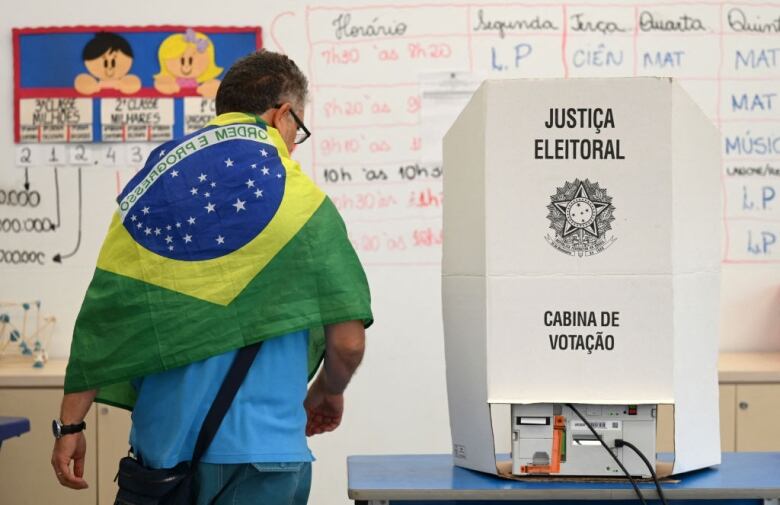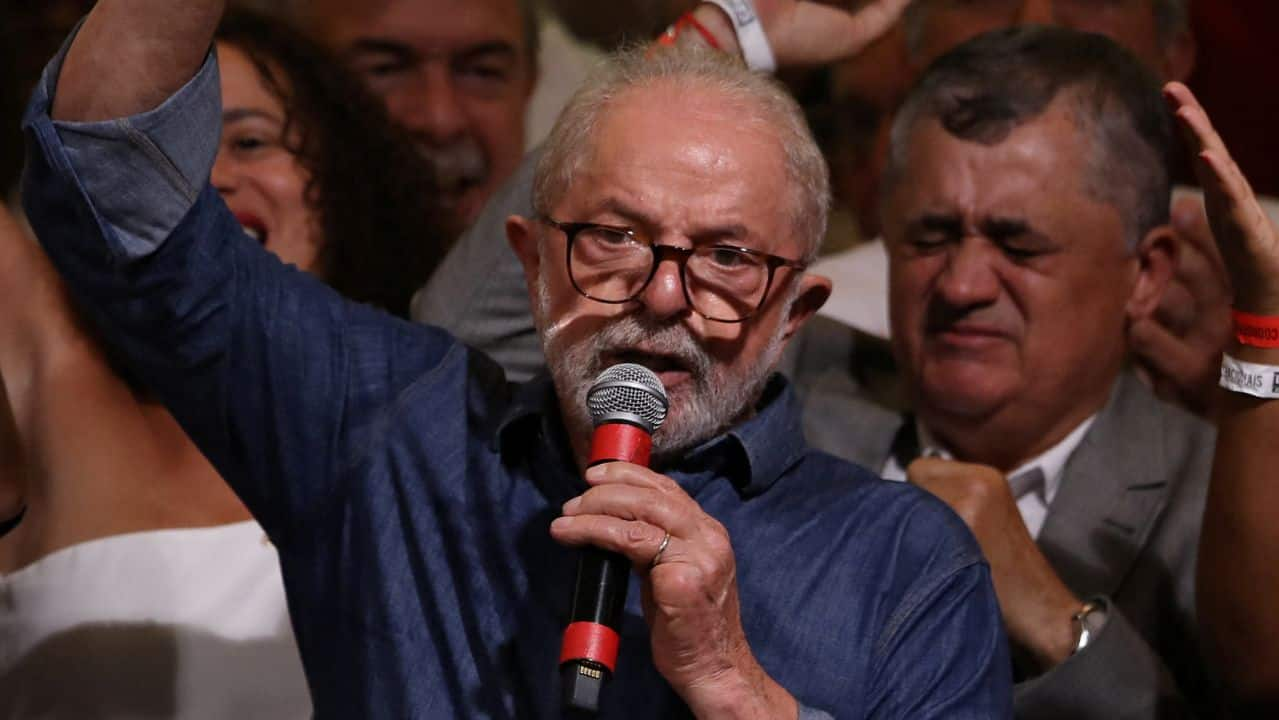Luiz Inacio Lula da Silva has done it again: Twenty years after his first victory as Brazilian president, the leftist beat incumbent Jair Bolsonaro on Sunday in an extremely close election that marks a U-turn for the country after four years far-right politics.
With over 99% of the vote in the second round, Lula had 50.9% and Bolsonaro 49.1%, and the electoral authority said Lula’s victory was a mathematical certainty.
It’s a stunning return to power for Lula, 77, whose 2018 jailing over a corruption scandal sidelined him from that year’s election, which brought Bolsonaro, an advocate of conservative social values, to power.
“Today the only winner is the Brazilian people,” da Silva said in a speech at a hotel in downtown Sao Paulo. “It is not a victory for me or the Workers’ Party, nor for the parties that supported me during the campaign. It is the victory of a democratic movement that has formed above the political parties, personal interests and ideologies for democracy to emerge victorious.”
Lula promises to govern beyond his left-wing Workers’ Party. He wants to bring in centrists and even some right-wingers who voted for him for the first time, and restore the country’s more prosperous past. Yet he faces headwinds in a politically polarized society where economic growth is slowing and inflation is soaring.
His victory marks the first time since Brazil’s return to democracy in 1985 that the incumbent president has not been re-elected. The highly polarized election in Latin America’s largest economy extended a wave of recent victories by the left in the region, including in Chile, Colombia and Argentina.
As Lula spoke to his supporters – promising to “govern a country in a very difficult situation” – Bolsonaro had yet to concede the election.
It was the country’s tightest election in more than three decades. Just over two million votes separated the two candidates with 99.5% of the votes counted. The previous closest race, in 2014, was decided by a margin of 3.46 million votes
Lula’s inauguration is scheduled for January 1. He last served as president from 2003 to 2010.
Thomas Traumann, an independent political analyst, compared the results to US President Joe Biden’s victory in 2020, saying Lula inherits a deeply divided nation.
“Lula’s huge challenge will be to pacify the country,” he said. “People are not only polarized on political issues, but also have different values, identity and opinions. Moreover, they don’t care about the values, identities and opinions of the other side.”
Congratulations for Lula – and Brazil – began pouring in from around the world on Sunday evening, including from US President Joe Biden, who highlighted the country’s “free, fair and credible elections”. The European Union also praised da Silva in a statement, praising the election authority for its efficiency and transparency throughout the campaign.
In a stunning political comeback, Luiz Inacio Lula da Silva defeated incumbent Jair Bolsonaro after a close presidential election that ended in a runoff. Lula has previously governed Brazil, last serving as president from 2003 to 2010.
Bolsonaro had led throughout the first half of the count and, as soon as Lula passed him, cars on the streets of downtown Sao Paulo started honking. People could be heard in the streets of the Ipanema district of Rio de Janeiro shouting: “It’s turned!”
Lula’s headquarters in downtown Sao Paulo’s hotel only erupted after the final result was announced, underscoring the tension that characterized this race.
“Four years of waiting for this,” said Gabriela Souto, one of the few fans allowed in due to heavy security measures.

Outside Bolsonaro’s home in Rio de Janeiro, ground zero of his base of support, a woman on top of a truck said a prayer over a loudspeaker, then sang excitedly, trying to generate energy. But supporters decked out in the green and yellow of the flag barely responded. Many woke up when the national anthem played, singing loudly with their hands on their hearts.
Most opinion polls ahead of the election gave Lula a lead, although political analysts agreed the race had become increasingly close in recent weeks.
For months, it appeared Lula was headed for an easy win as he stoked nostalgia for his 2003-2010 presidency, when Brazil’s economy was booming and welfare aid helped tens of millions people to join the middle class.
The Brazilian people have spoken. I look forward to working with @LulaOficial to strengthen the partnership between our countries, to deliver results for Canadians and Brazilians, and to advance shared priorities, such as environmental protection. Congratulations Luna!
But while da Silva led the October 2 first-round election with 48% of the vote, Bolsonaro was second with 43%, showing that opinion polls significantly underestimated his popularity. Many Brazilians support Bolsonaro’s defense of conservative social values and he has built his support in an election year with huge government spending.
Bolsonaro’s administration has been marked by inflammatory rhetoric, his testing of democratic institutions, his widely criticized handling of the COVID-19 pandemic and the worst deforestation of the Amazon rainforest in 15 years. But he has built a dedicated base by championing conservative values and portraying himself as a hedge against left-wing policies that he says undermine individual freedoms and produce economic turmoil.
Return policy
Lula is credited with implementing an extensive social welfare program during his tenure from 2003 to 2010 that helped bring tens of millions into the middle class and preside over an economic boom. He left office with an approval rating of over 80%; prompting then US President Barack Obama to call him “the most popular politician on Earth”.
But he is also remembered for his administration’s involvement in vast corruption uncovered by sprawling investigations. Lula’s arrest in 2018 kept him out of that year’s race against Bolsonaro, a fringe lawmaker at the time who was an avowed fan of former US President Donald Trump.
Lula was imprisoned for 580 days for corruption and money laundering. His convictions were later overturned by Brazil’s highest court, which ruled the court president had been biased and colluded with prosecutors. This allowed Lula to run for the country’s highest office for the sixth time.
Lula pledged to increase spending for the poor, restore relations with foreign governments and take bold steps to eliminate illegal clear-cutting in the Amazon rainforest.
It has not provided specific plans on how it will achieve these goals and faces many challenges. The president-elect will face strong opposition from conservative lawmakers likely to take inspiration from Bolsonaro.
The “enormous” political divide in Brazil
Carlos Melo, professor of political science at Insper University in Sao Paulo, compared the likely political climate to that experienced by former President Dilma Rousseff, Lula’s hand-picked successor after her second term.
“Lula’s victory means that Brazil is trying to overcome years of turmoil since the re-election of President Dilma Rousseff in 2014. This election has never ended; the opposition demanded a recount, she governed under pressure and was impeached two years later,” Melo said. . “The gap became huge and then did Bolsonaro.”
This year, unemployment has fallen to its lowest level since 2015 and, although headline inflation has slowed during the campaign, food prices are rising at a double-digit rate. Bolsonaro’s social benefits have helped many Brazilians get by, but Lula has come forward as the candidate most willing to continue aid in the future and raise the minimum wage.

Lula has also pledged to end illegal deforestation in the Amazon and once again has prominent environmentalist Marina Silva at his side, years after a public row when she was his environment minister. The president-elect has already pledged to install a ministry for the native peoples of Brazil, which will be led by an indigenous person.
In April, he tapped centre-right Geraldo Alckmin, a former rival, to be his running mate. It was another key part of an effort to create a broad pro-democracy front not just to unseat Bolsonaro, but to facilitate government. Lula also won the support of Senator Simone Tebet, a moderate who finished third in the first round of elections.
“If Lula manages to speak to voters who did not vote for him, which Bolsonaro has never tried, and seek negotiated solutions to the economic, social and political crisis we have, and links with other nations that were lost, then he could reconnect Brazil in a time when people could disagree and still do certain things,” Melo said.

“Coffeeaholic. Lifelong alcohol fanatic. Typical travel expert. Prone to fits of apathy. Internet trailblazer.”

